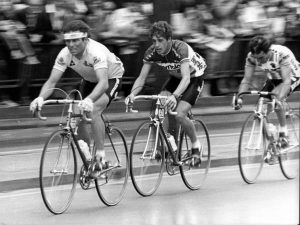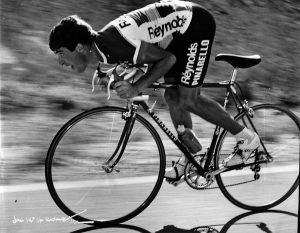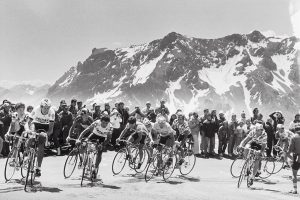1983. Reynolds. His debut in Le Tour.
He had a good start to his second season as a professional. He was leader of the Tour of the Basque Country, although he lost the yellow jersey in the uphill time trial on the last day. He was in good shape in the Tour of Spain, until the stage of Castellar de Nuch (which saw a memorable win by Alberto Fernández) and where a fall made him lose precious time. The next day he regained the lost time in a brilliant mountain stage which finished in Viella.On the following stage, both the cold and a temperature killed all his chances in the general classification.
 |
| Last day in La Vuelta 1983, riding alongside Bernard Hinault in El Paseo de la Castellana, Madrid. |
He won a stage, as well as the mountain prize in the Vuelta a los Valles Mineros. He also won the Tour of Aragón where he also garnered a stage victory.
With a boosted morale, he faced his first Tour of France; in those days, the most fearful and wretched race of all for Spanish riders and teams. They didn’t want to race it for fear of being the laughing stock of the cycling world. «A good result was just to finish the race, or be in the top ten of a stage or so. People from the Spanish cycling world told us we were crazy and asked us what we thought we were doing, that it was madness to go, that we shouldn’t even attempt to take part and that we had nothing to win but a lot to lose».
In this situation, they faced the Tour of ’83. In one of the opening stages of the Tour, they had to endure the last 150 kms of the prestigious Paris-Roubaix Classic. This was a black day for Pedro as he finished 9 minutes down on the winner. He waited impatiently for the mountains, the rhythm of the flatearthers got to his legs and on the 10th stage, already in the Pyrenees, he came second at only 6″ from Robert Millar and was now 8th in the General Classification. From then on, Pedro began to climb up thru the classification as they went through the French Central Massif until he reached the 2nd place. However some food in a bad state provoked a stomach ailment and he saw how, from starting the stage with a winner’s mentality and finishing 25 minutes after the victor, all his hopes were now dashed. He finished the Tour 15th at 25’44» from Laurent Fignon. «I didn’t really realise at the time that I could have won the Tour. It was like being in a dream; I was in the clouds. I knew I was second but it didn’t seem real to me. In the Morzine stage, when I lost everything, I was perfectly aware of my second place, I even thought of winning the stage or wearing the yellow jersey, but that day was a wretched one for me». He finished the season with a 5th place in the Vuelta a Cataluña and came 2º in the Subida a Naranco.
Pedro Delgado revealed himself to be a «Tour man», a rider who could stand the July heat, the toughness of the Alps and the Pyrenees, with their 15 or 20 km long ascents or more, where the Segovian’s qualities stood out above the rest.
 |
 |
| Stage 10th Tour’83 Pau y Bagnères-de-Luchon, Pedro became popular with a new style and crazy on the descent of Peyresourde, nicknamed «le fou des pyrénées». | Stage 17th final at Alpe d’Huez. |